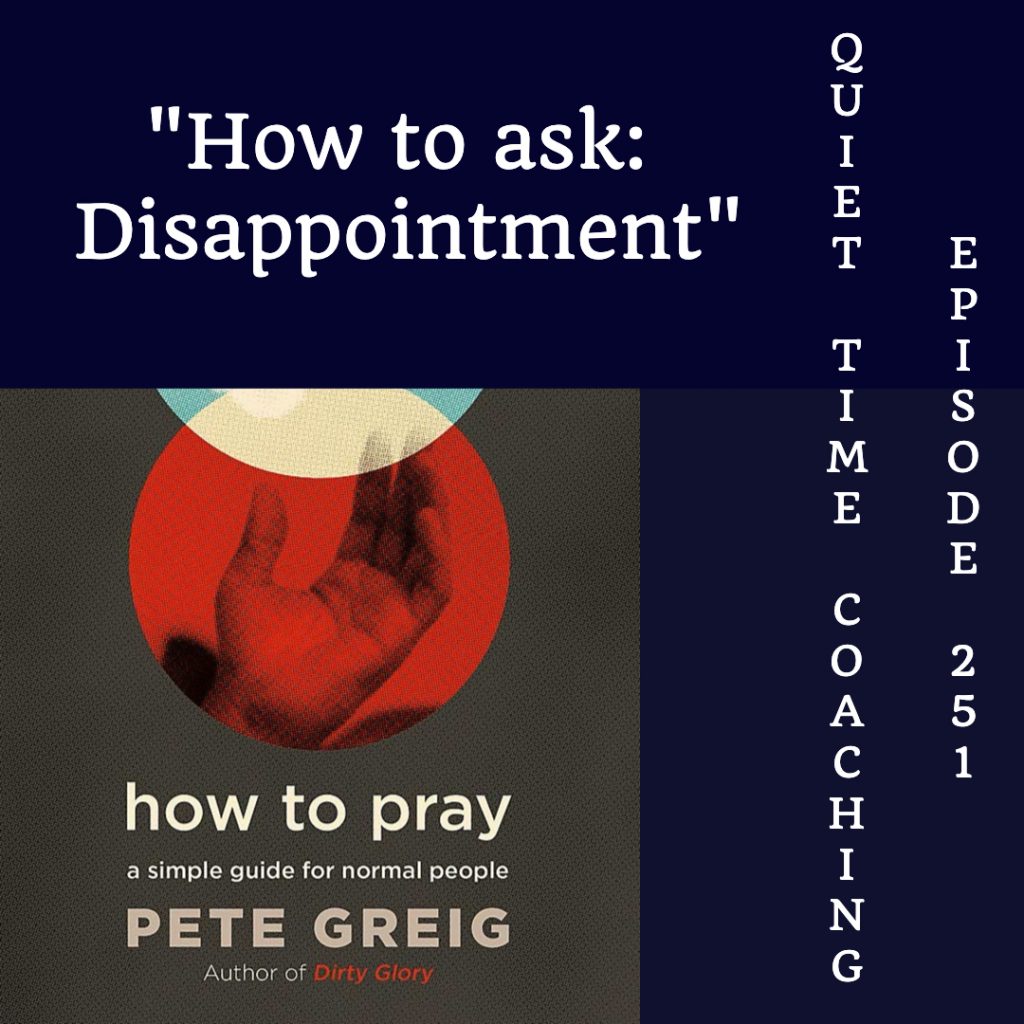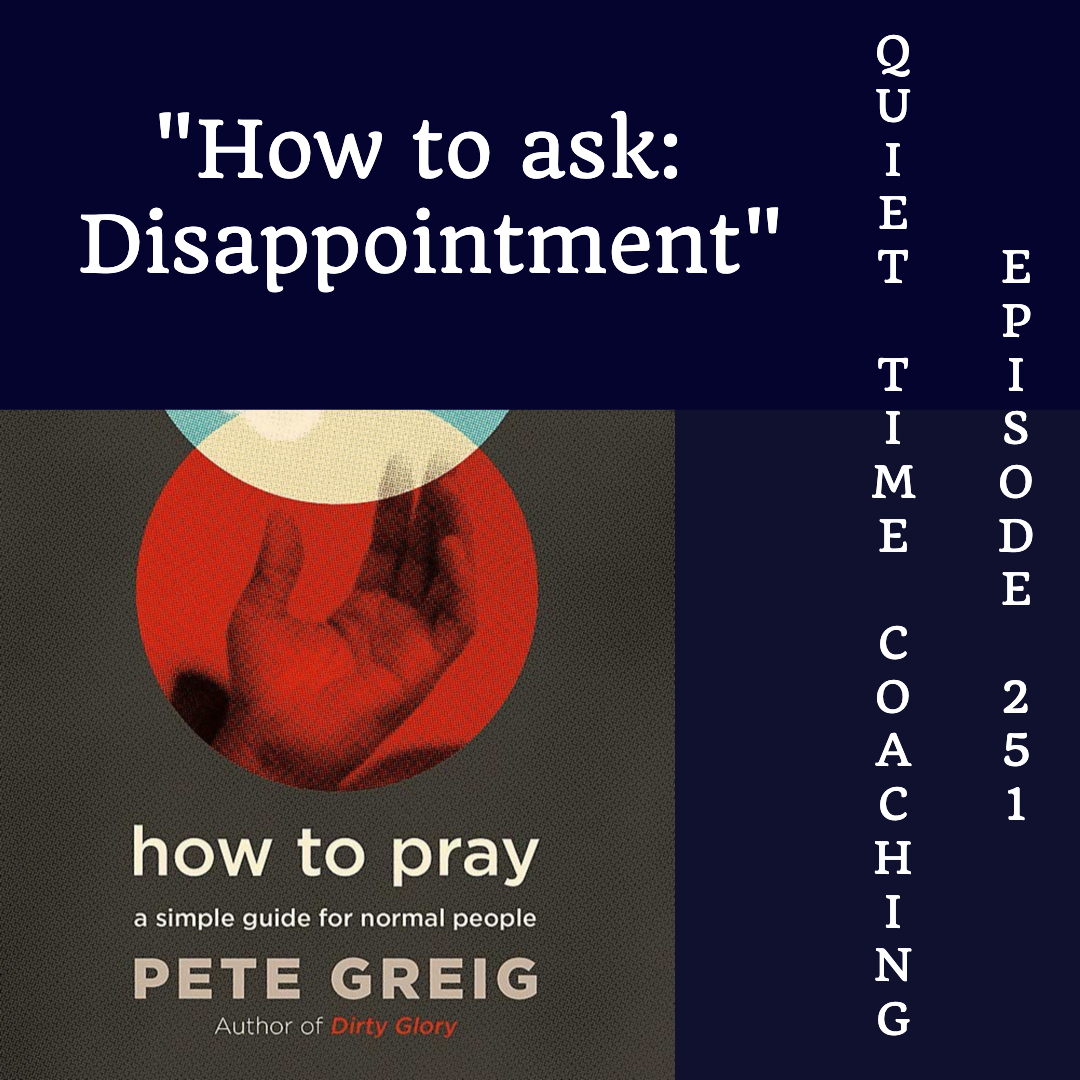Quiet Time Coaching Episode 251

- I am in my third year of participating in the Renovare book club. The first book in this season’s set of four is “How to pray” by Pete Greig.

- Quiet time coaching episodes will focus on his book for the next few weeks. You don’t need to read it to benefit from these recordings, but you might like to get hold of a copy for yourself. I have finished the book and can thoroughly recommend it. A full review of the book will come at a later date in “What we are reading”.
- Today we will reflect on the seventh chapter of the book, “Unanswered prayer: How to deal with disappointment”.Theme scripture: “‘Your will be done.’” (Matthew 6:10 NIV11)
- Last week we explored intercession – asking our heavenly Father for what other people need. This week we move on to the difficult topic of unanswered prayer.
- We all have our unanswered prayer list. It’s not one we look at very often. We don’t get it out to show other people. How do we respond when prayers, sincere prayers, have been faithfully offered?The Bible is way more honest about unanswered prayer than the Church. Greig, Pete. How to Pray: A Simple Guide for Normal People (p. 104). John Murray Press. Kindle Edition.
- We are in good Biblical company. Indeed, we are in company with Jesus whose prayer for the cup to be taken away was not answered. Most emphatically not answered.
- It’s an extraordinary thought that Jesus himself sits at the right hand of the Father today, carrying the pain of unanswered prayer. Greig, Pete. How to Pray: A Simple Guide for Normal People (p. 105). John Murray Press. Kindle Edition.
- Wherever you stand or however you feel about unanswered prayer, bear this in mind – Jesus stands with you.
- With these thoughts in mind, let’s turn to some suggestions from the book to help us process and unanswered prayer.
1. Choose to be vulnerable with your friends
He took Peter, James and John along with him, and he began to be deeply distressed and troubled … ‘Stay here and keep watch.’ (Mark 14:33–34)
- Tough times of prayer and tough prayer topics are made more bearable when accompanied by friends. Don’t isolate yourself when you’re going through difficult times of prayer. If Jesus needed his friends around him, so do you and I.
2. Choose to push into prayer
And being in anguish, he prayed more earnestly. (Luke 22:44)
- We certainly need our friends, but we need our heavenly Father even more. Jesus knew he needed God. Thus he went to his knees and prayed with passion.
- I remember the day I got the phone call to say that one of our members, Colin, had died in a tragic work accident. I was holding the phone but fell to my knees. It was the only appropriate thing to do.
3. ‘Abba, Father…’ – hold on to God’s love
- Much like a small child, we may not understand what’s going on, but we know we can trust a loving parent.
It’s important to remember that we are perfectly able to trust that which we cannot understand, ‘“For my thoughts are not your thoughts, neither are your ways my ways,” declares the Lord.’ Greig, Pete. How to Pray: A Simple Guide for Normal People (p. 107). John Murray Press. Kindle Edition.
4. ‘Everything is possible for you…’ – hold out for God’s power
- Our pain can obscure God’s power. Yet, no matter our confusion or disappointment, it makes no difference to the potentiality of the power of God in any particular circumstance.
No matter how hard it is to keep trusting when our deepest, most desperate prayers go unanswered, getting rid of God’s love and God’s power doesn’t actually help. In fact, it makes things much worse. Greig, Pete. How to Pray: A Simple Guide for Normal People (p. 108). John Murray Press. Kindle Edition.
5. ‘Take this cup from me…’ – be honest
- Have you ever prayed a prayer like this? An honest, naked prayer. No putting on a brave face here.
Jesus prays five of the most surprising words in the entire Bible. He asks God for an alternative to the cross. This is Jesus at his most vulnerable, and he appears to be praying ‘unbiblically’. Greig, Pete. How to Pray: A Simple Guide for Normal People (p. 108). John Murray Press. Kindle Edition.
6. ‘Yet not what I will, but your will be done’ – the prayer of relinquishment
- We don’t always know what God’s will is, and he is not about to do what we want just because we ask.
THE CREATOR IS NOT A COSMIC SLOT MACHINE, WAITING TO OBLIGE OUR PRAYERS WITH A CAN OF COKE OR PEACE IN THE MIDDLE EAST Greig, Pete. How to Pray: A Simple Guide for Normal People (p. 111). John Murray Press. Kindle Edition.
- Jesus arrives at a place of relinquishment towards the end of his prayer in the garden.
He may not want God’s will, but he chooses it nonetheless. Greig, Pete. How to Pray: A Simple Guide for Normal People (p. 113). John Murray Press. Kindle Edition.
Conclusion
- Pete ends the book with this wonderful quote from John Newton:
Some Christians are called to endure a disproportionate amount of suffering. Such Christians are a spectacle of grace to the church, like flaming bushes unconsumed, and cause us to ask, like Moses: ‘Why is this bush not burned up?’ The strength and stability of these believers can be explained only by the miracle of God’s sustaining grace. The God who sustains Christians in unceasing pain is the same God – with the same grace – who sustains me in my smaller sufferings. We marvel at God’s persevering grace and grow in our confidence in Him as He governs our lives. Greig, Pete. How to Pray: A Simple Guide for Normal People (p. 113). John Murray Press. Kindle Edition.
- Questions for discussion:
- What stands out to you about disappointment in prayer?
- How might your prayer life grow if you could learn how to respond to unanswered prayers with faith?
- Suggestion: Choose one of the six characteristics of Jesus’ approach to prayer and make it a focus for the next seven days.
- Resources mentioned in the book:
- PRAYER TOOLS: (1) The Prayer of Relinquishment. (2) How to Lament (prayercourse.org).
- FUTHER READING: Luminous Dark, by Alain Emmerson; God on Mute, by Pete Greig.
- Next week we will go on to look at contemplative prayer.
- Please add your comments on this week’s topic. We learn best when we learn in community.
- Do you have a question about teaching the Bible? Is it theological, technical, practical? Send me your questions or suggestions. Here’s the email: malcolm@malcolmcox.org.
- If you’d like a copy of my free eBook on spiritual disciplines, “How God grows His people”, sign up at my website: http://www.malcolmcox.org.
- Please pass the link on, subscribe, leave a review.
- “Worship the LORD with gladness; come before him with joyful songs.” (Psalms 100:2 NIV11)
- God bless, Malcolm
- PS: You might also be interested in my book: “An elephant’s swimming pool”, a devotional look at the Gospel of John



